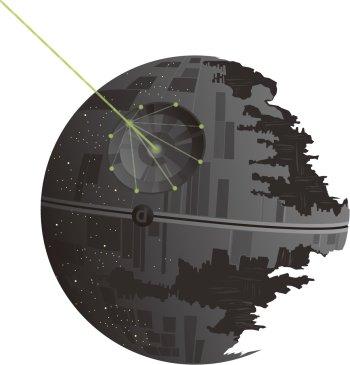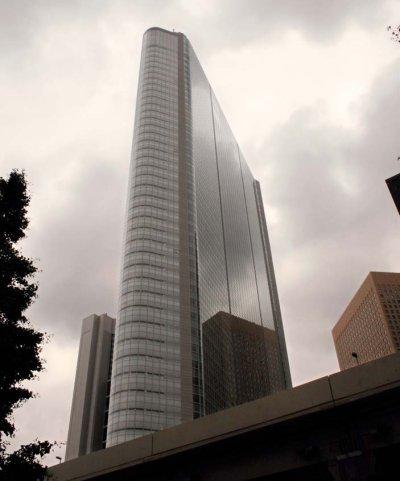Deconstructing Dentsu

By Makoto Goldstein
The advertising industry in Japan is a unique creature and many believe that it is driven, like so many other facets of Japan’s history, by one major ruling body. In the marketing realm, the Shogun is Dentsu. Dynamic they may not be, yet all encompassing and all-purveying they most definitely are.
A former industry professional told us, “Dentsu, the Toyota of advertising in Japan, is still a force to be reckoned with, a supertanker, filled with people who are usually arrogant, over paid, and foot soldiers with a herd mentality.”
It would be fair to say that Dentsu does not hold a great deal of credibility amongst its peers and competitors and that the common perception, particularly amongst the foreign agencies is that Dentsu lacks creative substance and relies more on old-school Japanese business practices and its monolithic market presence. Dentsu does however wield a huge amount of power and uses this to its full extent—just the penning of an article such as this could potentially lead to the plug being pulled on an entire publication. Smaller operators can be forced out of business when their clients are acquired by Dentsu and this is sometimes alleged to be executed fairly forcibly.
The facts
Dentsu’s billings are more than double its nearest local competitors, Hakuhodo and ADK. Dentsu’s success and dominance in Japan stems from its long history as a media agent. They reportedly produced the first newspaper advertisements as well as the first television commercials in Japan. Dentsu started building its empire in the early part of the 21st Century and now it is infamous for utilizing this history to secure the lion’s share of the modern market, showing net sales of a staggering ¥2,057,554 million for fiscal 2007. According to a number of industry sources, a common phrase heard from Japanese clients when tendering against Dentsu is ‘they are the oldest agency in Japan.’ This cannot be argued with but there is definite cause to question the relevance of history (potentially lending itself to archaic practices) in one of the most cutting edge industries of the modern business world. In terms of actual grunt, the corporate offices of Dentsu amasses 48 floors rising to 213.34m, it is the eleventh tallest building in Tokyo and employs around 12,000 people. Orwell’s Ministry of Truth Building is only slightly more impressive at 300m and holding 3000 rooms. And the similarities do not end there.
The rumors
Dentsu has a reputation for being a sweatshop for its employees, working them until all hours and shunning creativity to make room for corporate bullying and anti-competitive practices. Meanwhile, more international agencies in the vein of McCann, Wieden & Kennedy and Diamond are revolutionizing the local market with their ingenuity and daring to go where Dentsu has not ventured before. This, however, is not an easy battle. Recently it appears that Dentsu has realized this, with former CEO Mataki rallying his employees: “Energy, courage and an entrepreneurial spirit among all our employees will be needed if the Dentsu Group is to shed its skin, evolve and grow into something new. Now is the time for us all to bind our hearts together, looking forward to the victory that awaits us.”
Dentsu seemingly prefer to hire people with links to the center of power
The Japanese market in general is known to hold loyalty and longevity of relationship in very high regard when choosing partners to work with. Dentsu has effectively leveraged its historical presence to curry favor (to the value of billions of dollars) with the old boys club of corporate Japan. Dentsu however, is not invulnerable and the increasing pressure for more creative, dynamic and globally focused solutions in advertising and PR has meant that it has needed to develop more innovative survival tactics. One such tactic is rumored to be its strategic hiring policies. At the expense of developing innovation and nurturing new creative talent, Dentsu seemingly prefer to hire people with links to the center of power, I.e. Children of politicians, notable public officials and influential business people. This can come in handy when competing for a large account.
There was much coverage in the press some time ago about fixed public meetings where the government had allegedly paid people to attend and lead the discussion in a direction preferable to them. Dentsu was very heavily involved here as they had been given the contract to promote and execute these public meetings. The Socialist Democratic Party’s Nobuto Hosaka, through investigating these government meetings uncovered an interesting fact; it seems that Dentsu was only officially contracted to run these events 24 hours before the first one took place. Since promotion for these events had been running for months in advance at both local and national levels and the venues were pre-booked, it would be difficult to convince anyone that even Dentsu could achieve such a result in just one day (regardless of the fact that people were actually paid to attend). This is just one illustration of Dentsu’s amazing talent of being able to effectively win government project competitions (loose tender systems) and eliminate the competition before the process is even in motion.
Dentsu is the government’s first choice in the marketing/PR arena. For example, when Japan Tobacco was forced to publish a public apology, Dentsu was very smartly assigned the task of taking all of the money and placing these large, costly looking advertorials across the full spectrum of its media. I say ‘its’ because they do effectively own a majority of all television advertising space.
PR & the competition
In speaking with some of Dentsu’s competitors in the local PR market, doubt was often placed on Dentsu’s approach to media in general. Robert Pickard, President of North Asia for Edelman remarks, “Some say that Dentsu doesn’t earn articles for its clients through meaningful interaction with reporters and editors so much as it simply adds articles on top of an advertising buy, pre-negotiated with media bosses. The result is synthetic advertorial rather than compelling editorial that dampens the development of a modern PR industry and makes the media an accomplice to the debasement of journalistic standards.”
In the PR realm, Dentsu seems to place little to no importance on developing credibility in the market by earning editorial space for their clients. Their approach is more of a ‘populate the space we own with advertorial’ blanket approach, where tact and guile is vetoed by pure fiscal muscle. When money talks for the very last time, things may change but until then we are faced with a market ruled by the mammoth (prehistoric in approach and generally hairy).
DPR (Dentsu’s PR wing) are infamous coat-tail surfers and many competitors would prefer not to compete with them for accounts where the client use Dentsu’s advertising agency. The standard DPR sales pitch is pretty much; ‘Hi we are from DENTSU, you already work with our Ad agency, sign here.’
 As sinister as it looks? The Dentsu headquarters.
As sinister as it looks? The Dentsu headquarters.
PR is a relatively new industry globally and its growth has been necessitated by increasing demand for crisis communication, damage control and corporate profile rendering. These facts alone would suggest that the industry calls for leading edge practice, executed by advanced minds operating in a modern environment. This is where Dentsu falls down and the PR pros like Edelman, Weber-Shandwick and the like really come into their own. Mr Pickard says he is building the PR A-team—strong intelligent professionals who can provide proactive and effective PR support for their clients where corporate reputation and budget is at stake. Edelman pride themselves on the fact that they operate at the complete opposite end of the industry to Dentsu and they are becoming more and more successful in Japan. Truly international teams like Edelman have an immediate advantage through their internal make-up and company focus. This has become more and more obvious (and worrying) to Dentsu. We have seen lately that it is increasingly approaching foreign firms for partnerships to boost its image (albeit from a face only perspective) with clients requiring an out-facing truly global solution. Unearned media coverage is less and less effective to savvy consumer and corporate markets and Dentsu’s reputation is suffering as a result. An ironic situation is developing where the mammoth itself is in need of some PR advice.
From experience
I have had the pleasure of working with Dentsu myself and I can most closely relate my experience to that of bribing a traffic cop in the developing world. They are effectively worry-mongers and blame-dampeners. Our Japanese corporate partner wanted Dentsu involved as a cushion between our dynamic foreign style and, what I assume, is their having to answer to a higher internal power over expenditure and ensuring success of the project. Dentsu seem to provide a kind of multi-million yen insurance policy, where some responsibility is shifted from the heads of the client-side staff (for their self-preservation) and it is honestly very difficult to see what value was added for the extra cost.
I was frustrated by their ability to make simple decisions seem like squeezing sake from a spud and, in my eyes, they only really filled the role of a filter or speed humps. The experience, although painful, was almost worth it to see the inner workings of the Deathstar and ride on what just may be the fastest elevator in Shiodome. At one point I was certain that they were trying to convince me that I was spelling my own name wrong. Hey, they are the oldest advertising agency in Japan, it had me thinking. In conclusion, the Dentsu phenomenon is here to stay and, to be fair, these practices are not at all exclusive to the Japanese giants. Moreover, advertising industry powers globally are increasingly coming under fire for overuse of unearned media coverage and market bullying.
Here in Japan the old guard is standing strong in support of their oldest advertising agency and the ‘Shiodome Deathstar’ will continue to swallow up advertising and PR competitors where possible to ensure market dominance. As long as this continues, Dentsu will keep the local Advertising and PR industries significantly diluted so as not to splash too much color onto the traditional greys of the Japanese business world.
War is Peace, Freedom is Slavery and, in the Japan ad-world, Ignorance definitely is Strength. JI






Comments
Rex (not verified)
July 2, 2008 - 14:54
Permalink
Nice piece
Sorry for sounding pedantic, but weiden is spelled Wieden, and I think you mean the early 20th Century (not 21st Century for Dentsu) and why on earth did you cite Diamond instead of, well, just about any other agency in Tokyo. I love Jeff Lippold as much as the next guy. Even moreso. But you could have said Fallon Tokyo, Beacon Communications, or even Ogilvy & Mather.
That said, I really enjoyed the piece and it's quite topical given Dentsu's sudden (alleged) interest in bringing on a foreigner. The best person to talk with about Dentsu is John Moore. He is the only foreigner to ever win the prestigious Dentsu President's Award.
-- Rex
Anonymous (not verified)
August 5, 2008 - 11:53
Permalink
Amen!
John Moore it is! Tell it like it is, Rex!
Adam (not verified)
July 16, 2008 - 10:41
Permalink
Hakuhodo
Food for thought. i would like to know more about Hakuhodo too. Do they work together with Dentsu at all and is there any equity crossover?
Erick (not verified)
March 20, 2009 - 16:24
Permalink
Dentsu staff are overpaid?
Dentsu staff are overpaid? What're you smoking? Perhaps by Toyota's standards, but that's not saying much.
The article is fun. But it continues to spew the same stereotype we have always known. The author may not quite have had the pleasure to interact with the smart 5% of Dentsu, which holds the rest of the organization. (As with any large global organization.)